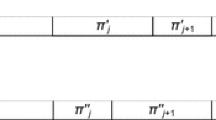Abstract
For single-machine scheduling with random machine breakdowns, a new method considering both robustness and stability is proposed in this paper. The stability of the predictive schedule is measured by the sum of the absolute deviations between the planned job completion times and the realized ones. A surrogate measure is developed to evaluate the stability, assuming that there is only one breakdown. Generating a robust and stable schedule becomes a bi-objective optimization problem. A two-stage multi-population genetic algorithm is proposed to solve the bi-objective optimization problem. The method is applied to minimizing the total weighted tardiness of all jobs. The computational results show that the schedule generated by the proposed method is insensitive to disturbances, along with providing better robustness and stability.
Similar content being viewed by others
References
Pinedo M (1995) Scheduling: theory, algorithms, and systems. Prentice-Hall, Englewood Cliffs, New Jersey
Herrmann JW, Lee C-Y, Snowdon JL (1993) A classification of static scheduling problems. In: Pardalos PM (ed) Complexity in numerical optimization. World Scientific, Singapore, pp 203–253
Uzsoy R, Lee C-Y, Martin-Vega LA (1992) A review of production planning and scheduling models in the semiconductor industry. Part I: system characteristics, performance evaluation and production planning. IIE Trans 24:47–60
Uzsoy R, Lee C-Y, Martin-Vega LA (1994) A review of production planning and scheduling models in the semiconductor industry. Part II: shop-floor control. IIE Trans 26:44–55
Leon VJ, Wu SD, Storer RH (1994) Robustness measures and robust scheduling for job shops. IIE Trans 26:32–43
Mehta SV, Uzsoy R (1998) Predictable scheduling of a job shop subject to breakdowns. IEEE Trans Robot Autom 14:365–378
Mehta SV, Uzsoy R (1999) Predictable scheduling of a single machine subject to breakdowns. Int J Comput Integr Manuf 12:15–38
O’Donovan R, Uzsoy R, McKay KN (1999) Predictable scheduling of a single machine with breakdowns and sensitive jobs. Int J Prod Res 37:4217–4233
Wu SD, Storer RH, Chang PC (1993) One-machine rescheduling heuristics with efficiency and stability as criteria. Comput Oper Res 20:1–14
Daniels RL, Kouvelis P (1995) Robust scheduling to hedge against processing time uncertainty in single-stage production. Manage Sci 41:363–376
Kouvelis P, Daniels RL, Vairaktarakis G (2000) Robust scheduling of a two-machine flow shop with uncertain processing times. IIE Trans 32:421–432
Abumaizar RJ, Svestka JA (1997) Rescheduling job shops under random disruptions. Int J Prod Res 35:2065–2082
Jain AK, Elmaraghy HA (1997) Production scheduling/rescheduling in flexible manufacturing. Int J Prod Res 35:281–309
Sabuncuoglu I, Karabuk S (1999) Rescheduling frequency in an FMS with uncertain processing times and unreliable machines. J Manuf Syst 18:268–283
McKay KN, Safayeni FR, Buzacott JA (1989) The scheduler’s knowledge of uncertainty: the missing link. In: Browne J (ed) Knowledge-based production management systems. Elsevier, Amsterdam, The Netherlands
Alcaide D, Rodriguez-Gonzalez A, Sicilia J (2002) An approach to solve the minimum expected makespan flow-shop problem subject to breakdowns. Eur J Oper Res 140:384–398
Zadeh L (1963) Optimality and non-scalar-valued performance criteria. IEEE Trans Automat Contr 8:59–60
Murata T, Ishibuchi H, Tanaka H (1996) Multi-objective genetic algorithm and its application to flowshop scheduling. Comput Ind Eng 30:957–968
Cochran JK, Horng S-M, Fowler JW (2003) A multi-population genetic algorithm to solve multi-objective scheduling problems for parallel machines. Comput Oper Res 30:1087–1102
Pasupathy T, Rajendran C, Suresh RK (2005) A multi-objective genetic algorithm for scheduling in flow shops to minimize the makespan and total flow time of jobs. Int J Adv Manuf Technol. DOI 10.1007/s00170-004-2249-6
Ponnambalam SG, Jagannathan H, Kataria M, Gadicherlaet A (2004) A TSP-GA multi-objective algorithm for flow-shop scheduling. Int J Adv Manuf Technol 23:909–915
Khoo LP, Lee SG, Yin XF (2000) A prototype genetic algorithm enhanced multi-objective scheduler for manufacturing systems. Int J Adv Manuf Technol 16:131–138
Fonseca CM, Fleming PJ (1995) An overview of evolutionary algorithms in multiobjective optimization. Evol Comput 3:1–16
Tamaki H, Kita H, Kobayashi S (1996) Multiobjective optimization by genetic algorithms: a review. In: Proceedings of the 1996 IEEE International Conference on Evolutionary Computation (ICEC’96), Nagoya, Japan, May 1996, pp 517–522
Horn J (1997) Multicriterion decision making. In: Back T, Fogel DB, Michalewicz (eds) Handbook of evolutionary computation. Oxford University Press, New York, pp F1.9:1–15
Holland JH (1992) Adaptation in natural and artificial systems: an introductory analysis with applications to biology, control, and artificial intelligence, 2nd edn. MIT Press, Cambridge, Massachusetts
Miller DM, Chen H-C, Matson J, Liu Q (1999) A hybrid genetic algorithm for the single machine scheduling problem. J Heuristics 5:437–454
Rachamadugu RMV, Morton TE (1981) Myopic heuristics for the single machine weighted tardiness problem. Working paper 28-81-82, Graduate School of Industrial Administration, Carnegie Mellon University, Pittsburgh, Pennsylvania
Michalewicz Z (1994) Genetic algorithm + data structure = evolution programs, 2nd edn. Springer, Berlin Heidelberg New York
Falkenauer E, Bouffoix S (1991) A genetic algorithm for job shop. In: Proceedings of the 1991 IEEE International Conference on Robotics and Automation, Sacramento, California, April 1991, pp 824–829
Cheng R, Gen M, Tsujimura Y (1999) A tutorial survey of job-shop scheduling problems using genetic algorithms. Part II: hybrid genetic search strategies. Comput Ind Eng 36:343–364
Gen M, Cheng R (1997) Genetic algorithms and engineering design. Wiley, New York
Bäck T (1994) Selective pressure in evolutionary algorithms: a characterization of selection mechanisms. In: Proceedings of the 1st IEEE Conference on Evolutionary Computation (ICEC’94), Orlando, Florida, June 1994, vol 1, pp 57–62
Author information
Authors and Affiliations
Corresponding author
Rights and permissions
About this article
Cite this article
Liu, L., Gu, Hy. & Xi, Yg. Robust and stable scheduling of a single machine with random machine breakdowns. Int J Adv Manuf Technol 31, 645–654 (2007). https://doi.org/10.1007/s00170-005-0237-0
Received:
Accepted:
Published:
Issue Date:
DOI: https://doi.org/10.1007/s00170-005-0237-0




